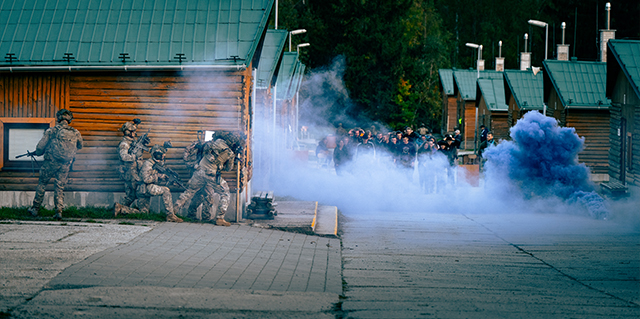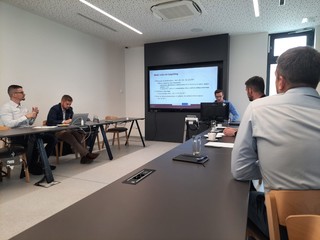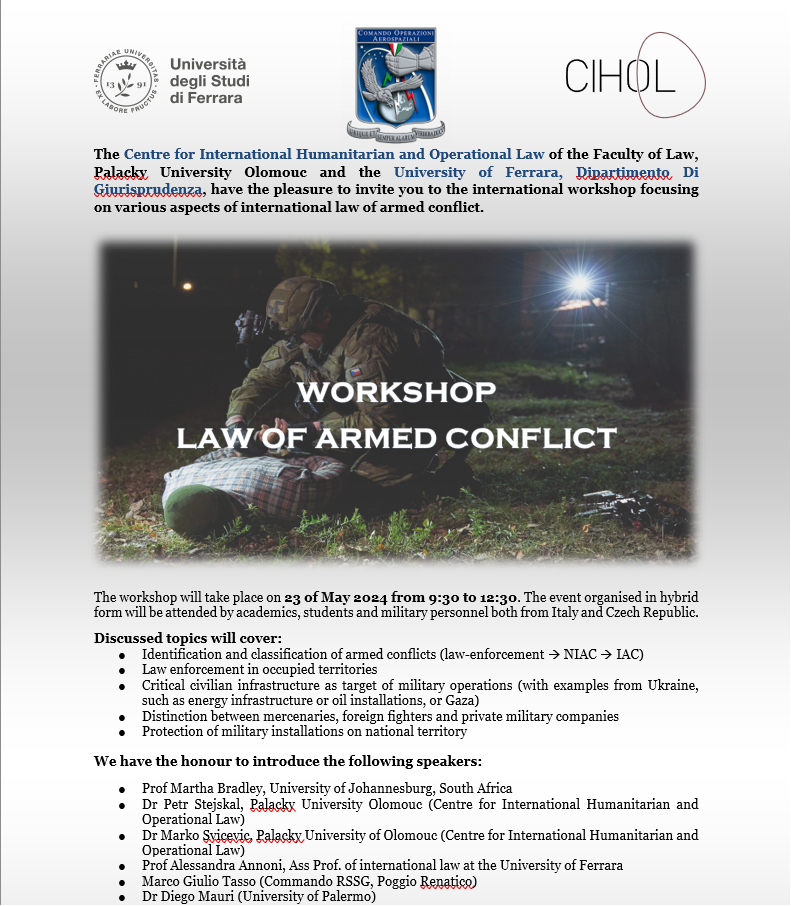Czech Republic publishes position paper on the application of international law in cyberspace
 The Czech Republic has joined a host of nations and organisations pronouncing on the applicability of international law in cyberspace (see here for the various positions). On 27 February, the Ministry of Foreign Affairs of the Czech Republic formally published its Position Paper on the Application of International Law in Cyberspace. The position paper, developed in cooperation with the Ministry of Defence and the National Cyber and Information Security Agency, highlights the official position of the Czech Republic on eleven key issues: state sovereignty, the prohibition of intervention; peaceful settlement of disputes; the use of force; the law of neutrality; international humanitarian law; international human rights law; State responsibility and attribution; retorsion; and circumstances precluding wrongfulness. For more information and analysis, see the brief below.
The Czech Republic has joined a host of nations and organisations pronouncing on the applicability of international law in cyberspace (see here for the various positions). On 27 February, the Ministry of Foreign Affairs of the Czech Republic formally published its Position Paper on the Application of International Law in Cyberspace. The position paper, developed in cooperation with the Ministry of Defence and the National Cyber and Information Security Agency, highlights the official position of the Czech Republic on eleven key issues: state sovereignty, the prohibition of intervention; peaceful settlement of disputes; the use of force; the law of neutrality; international humanitarian law; international human rights law; State responsibility and attribution; retorsion; and circumstances precluding wrongfulness. For more information and analysis, see the brief below.
CIHOL at the Annual Meeting of the Legal Service of Czech Armed Forces
Martin Faix, Head of the CIHOL, was invited to present a lecture on the "International Law Aspects of Developments in Ukraine after 2014" at the annual meeting of the Czech Armed Forces´ Legal Service. The meeting of some 60 military lawyers took place at the Chateau Komorní Hrádek and was a great opportunity to enhance the cooperation between CIHOL and the Armed Forces of the Czech Republic.
Call for Abstracts: International Law and the Regulation of Resort to Force: Exhaustion, Destruction, Rebirth? (Olomouc, 14 - 15 September 2023)
The CIHOL, in collaboration with the Institute for International Law and International Relations at the Faculty of Law of the University of Graz, are accepting papers and panel proposals for an ESIL supported conference to take place on 14–15 September 2023 in Olomouc, the Czech Republic. The conference will examine selected issues pertaining to the jus ad bellum. The conference will also include selected poster submissions on the teaching of international law on the use of force.
Call for papers/panels/posters and all relevant information is available at: www.force.upol.cz
Head of CIHOL commenting Russian aggression against Ukraine in the media
 Dr. Martin Faix, head of CIHOL and lecturer at the Palacky University in Olomouc, regularly comments on legal aspects of Russian invasion to Ukraine. During the last weeks, he has been invited by several media including Český rozhlas (Czech Radio, public radio broadcaster) and Česká televize (Czech Television, public television broadcaster) to explain legality of Russian actions under international law. In his appearances, he focused mostly on the legality of the use of force by Russian Federation and analysis whether the act of aggression has been committed by the latter.
Dr. Martin Faix, head of CIHOL and lecturer at the Palacky University in Olomouc, regularly comments on legal aspects of Russian invasion to Ukraine. During the last weeks, he has been invited by several media including Český rozhlas (Czech Radio, public radio broadcaster) and Česká televize (Czech Television, public television broadcaster) to explain legality of Russian actions under international law. In his appearances, he focused mostly on the legality of the use of force by Russian Federation and analysis whether the act of aggression has been committed by the latter.
The Centre for International Humanitarian and Operational Law issued its official statement on Russian invasion to Ukraine
The Centre for International Humanitarian and Operational Law issued its official statement on Russian invasion to Ukraine. The statement assesses the situation from the point of view of international law. It is available in Czech and English version.
Statements are available here (ENG version) and here (CZE version)
Lecture on "Lethal propaganda - fake news in post-conflict environment" by Vladimír Dzuro (06 December 2021)
Mr.  Dzuro currently works as Chief of Headquaters Office at the UN Office of Internal Oversight Services in New York. He shared his experience with investigation in former Yugoslavia and spoke about arresting war criminals and mass grave exhumation. On real examples, he also demonstrated the dangerousness of disinformation in conflict scenario.
Dzuro currently works as Chief of Headquaters Office at the UN Office of Internal Oversight Services in New York. He shared his experience with investigation in former Yugoslavia and spoke about arresting war criminals and mass grave exhumation. On real examples, he also demonstrated the dangerousness of disinformation in conflict scenario.
The lecture was also contributed by Kamil Sládek, historian and ethnologist, who provided historical and factual background of the conflict in former Yugoslavia, and by our member, Petr Stejskal, who examined legality of the arrest of Slavko Dokmanović.
The event was also streamed online and you can see the record of the lecture (in Czech language) here: https://www.youtube.com/watch?v=JQZwF37-eu4
Scientific Prize Awarded to our Member
 We are pleased to announce that our member, dr. Petr Stejskal, has been awarded Jacques Derrida Prize for Social and Humanitarian Sciences by the French Embassy in Prague and Karel Janeček Foundation. His research focused on the protection of foreign investment during armed conflict ranked second place in the competition. The evaulating committee appreciated innovative attitude towards research, topicality of examined topics and international significance. The award includes financial support for a one month stay at a scientific institution in France. Congratulations!
We are pleased to announce that our member, dr. Petr Stejskal, has been awarded Jacques Derrida Prize for Social and Humanitarian Sciences by the French Embassy in Prague and Karel Janeček Foundation. His research focused on the protection of foreign investment during armed conflict ranked second place in the competition. The evaulating committee appreciated innovative attitude towards research, topicality of examined topics and international significance. The award includes financial support for a one month stay at a scientific institution in France. Congratulations!
Cyber Incident Scenario part of NATO CCDCOE Interactive Cyber Law Toolkit
Hybrid threats are closely related to cyberspace and cannot be omitted in modern warfare and security assessment. Our members, Martin Faix and Petr Stejskal, prepared a scenario on “Misattribution caused by deception” for the Cyber Law Toolkit project. The project is supported by the NATO Co-operative Cyber Defence Centre of Excellence (NATO CCDCOE), NÚKIB and the ICRC.
 Hybrid threats, information operations and deception are closely related to cyberspace and cannot be omitted in modern warfare and security assessment. Members of the Centre for International Humanitarian and Operational Law, Martin Faix and Petr Stejskal, prepared an expert contribution for the Cyber Law Toolkit operated under the auspices of the NATO CCDCOE, ICRC, NÚKIB, US Nawal War College and several other expert bodies. Their analysis focused on cyber deception in international law. Publication of new scenarios for the Cyber Law Toolkit was announced at the 2021 CyberCon conference in Brno.
Hybrid threats, information operations and deception are closely related to cyberspace and cannot be omitted in modern warfare and security assessment. Members of the Centre for International Humanitarian and Operational Law, Martin Faix and Petr Stejskal, prepared an expert contribution for the Cyber Law Toolkit operated under the auspices of the NATO CCDCOE, ICRC, NÚKIB, US Nawal War College and several other expert bodies. Their analysis focused on cyber deception in international law. Publication of new scenarios for the Cyber Law Toolkit was announced at the 2021 CyberCon conference in Brno.
The Cyber Law Toolkit is an online resource for legal professionals who work with matters at the intersection of international law and cyber operations. At its core, it presently consists of 24 hypothetical scenarios. Each scenario contains a description of cyber incidents inspired by real-world examples, accompanied by detailed legal analysis.
The scenario prepared by our members formulates a model scenario of a cyber deception followed by misattribution and cyber attack against critical infrastructure. The topic chosen reflects the increasing sophistication of hostile cyber incidents and raises challenging legal questions.
Photo licensed from Shutterstock (original URL)
National Security Council Award granted to UP Faculty of Law
The Palacký University Olomouc Faculty of Law is the laureate of the 2020 National Security Council Award for significant contribution to the security policy of the Czech Republic, decided at its Monday meeting. In this way, the Council thus appreciated the long-term and progressive work of the faculty in matters of security and in the field of international humanitarian and operational law. Read more
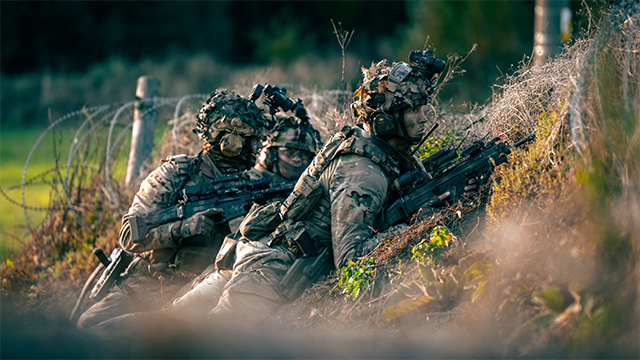
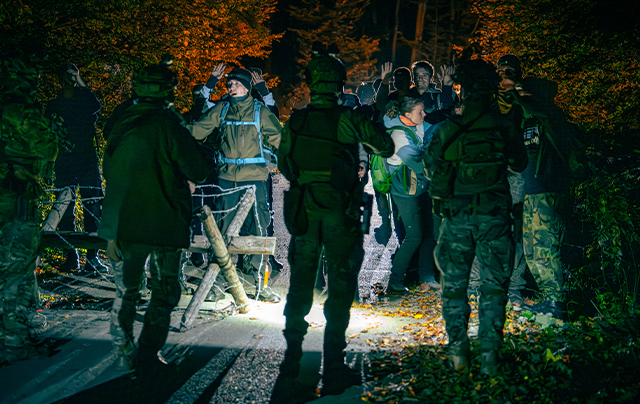
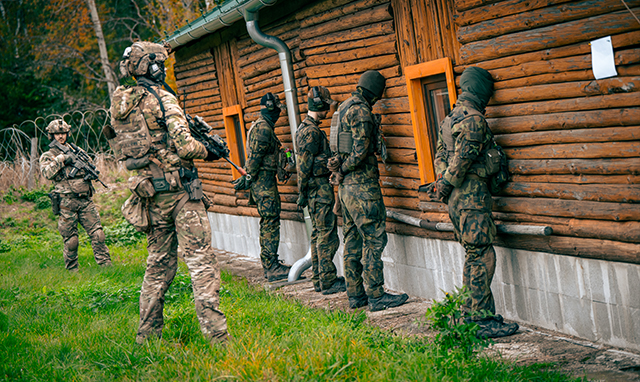
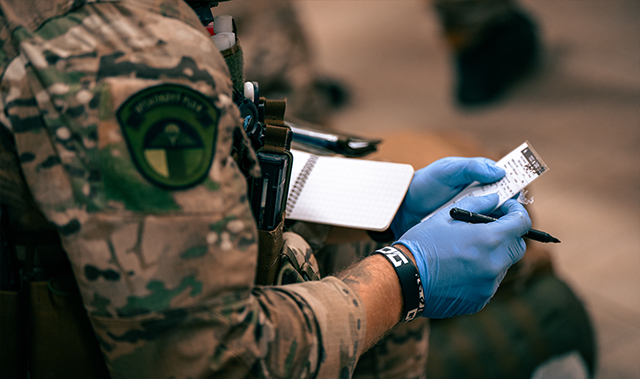 His classmate Matyáš Benešovský went to Camp Peira for the second time. "There are not many opportunities to get a hands-on experience of international humanitarian law. This exercise is great and exceptional. This year was even more intense than last year," evaluated Benešovský, who this time had the role of an informant in a manned village. When evaluating this year's event, he highlighted the subsequent expert discussions. "Not surprisingly, military and legal thinking is to some extent different, and this was evident during the debrief. I found the discussions very interesting and beneficial." Benešovský revealed that his participation in last year's event motivated him to join the active reserves of the Czech Army. "From the debates held on the way back from the exercise, I dare to guess that next year there will be several new members of the active reserves at the law school," he added.
His classmate Matyáš Benešovský went to Camp Peira for the second time. "There are not many opportunities to get a hands-on experience of international humanitarian law. This exercise is great and exceptional. This year was even more intense than last year," evaluated Benešovský, who this time had the role of an informant in a manned village. When evaluating this year's event, he highlighted the subsequent expert discussions. "Not surprisingly, military and legal thinking is to some extent different, and this was evident during the debrief. I found the discussions very interesting and beneficial." Benešovský revealed that his participation in last year's event motivated him to join the active reserves of the Czech Army. "From the debates held on the way back from the exercise, I dare to guess that next year there will be several new members of the active reserves at the law school," he added.